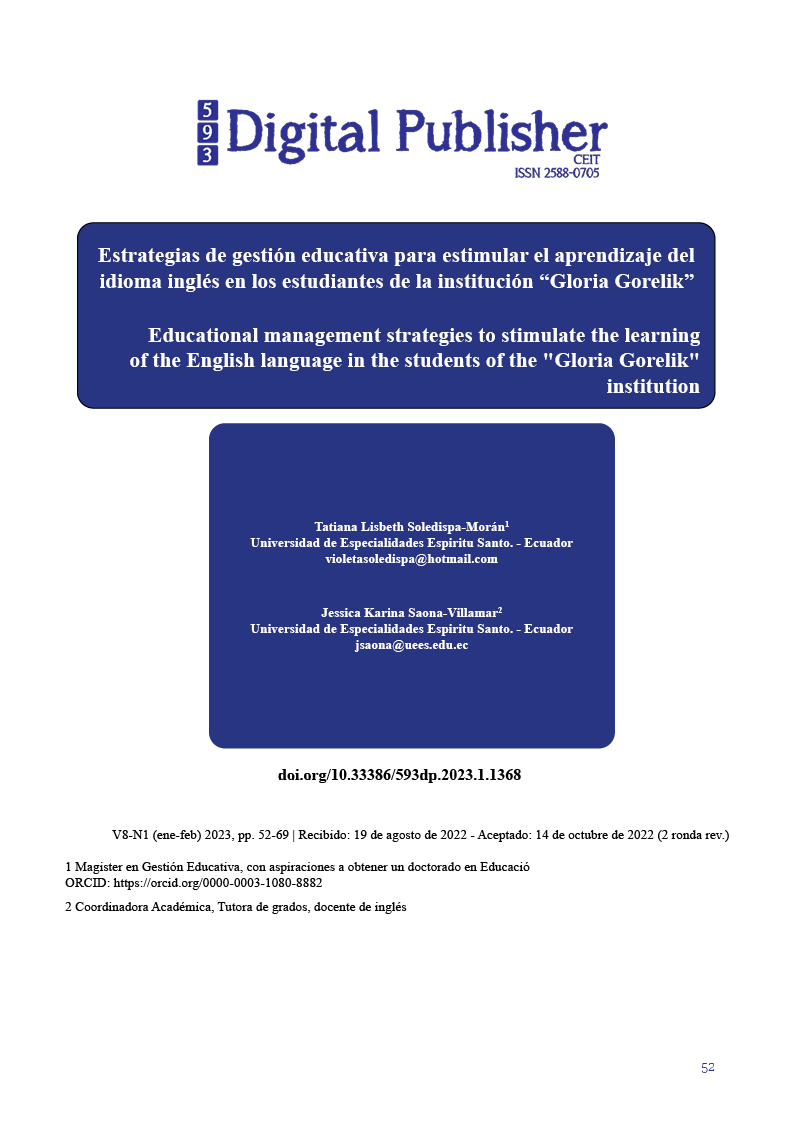Estrategias de gestión educativa para estimular el aprendizaje del idioma inglés en los estudiantes de la institución “Gloria Gorelik”
Main Article Content
Abstract
By the moment, nowadays we are at an environment where the English Language it is so essential in all the fields, due to the fact, the professional life and educational students are really more demanding. Thus, exist the necessity at all educational students that they must be stimulated and aware about the importance of learning and dominate the English language as a foreign as is being a worldwide language. It will permit a better ability development and competences facilitating the communication with various locals and international agents. Reason why the first proposal of this investigation is to design strategies about educational management to stimulate the learning English language to the students. This investigation is a quantitative approach research, where the hypothetical-deductive method was used, which allowed to raise real data, provided done to the students. Also, we applied empirical methodologies such as observation, surveys and questionnaires were applied, managing to develop the work in a systematic way through the collection, analysis and interpretation of the data, the target population to work with is: 111 high school students from the Educational Institution "Gloria Gorelik", with a target of 100 students. We must be conscious about the changes that we can conceive to the students when the right strategies are done adequately at the educational training. Therefore, educational management strategies were designed to stimulate the learning process from the English language to the students, to conclude it is important that the students require the strategies opportunely to contribute at the stimulation and acquire linguistic competences.
Downloads
Article Details

This work is licensed under a Creative Commons Attribution-NonCommercial-ShareAlike 4.0 International License.
1. Derechos de autor
Las obras que se publican en 593 Digital Publisher CEIT están sujetas a los siguientes términos:
1.1. 593 Digital Publisher CEIT, conserva los derechos patrimoniales (copyright) de las obras publicadas, favorece y permite la reutilización de las mismas bajo la licencia Licencia Creative Commons 4.0 de Reconocimiento-NoComercial-CompartirIgual 4.0, por lo cual se pueden copiar, usar, difundir, transmitir y exponer públicamente, siempre que:
1.1.a. Se cite la autoría y fuente original de su publicación (revista, editorial, URL).
1.1.b. No se usen para fines comerciales u onerosos.
1.1.c. Se mencione la existencia y especificaciones de esta licencia de uso.
References
Ali, E., Munir, M., Permana, J., y Kurniady, D. (2020). Academic service quality in education management in higher education. Advances in social science, edcuation and humanities research(400), 455-461. Obtenido de https://download.atlantispress.com/article/125933796.pdf
Alonso, P., y Blanco, J. (2017). SinoEle. Obtenido de SinoEle: http://www.sinoele.org/images/ Revista/10/Monográficos/EPES1011/EPES_II_23 5-
Añez, M. (2016). Relación entre las estrategias de aprendizaje y el rendimiento académico en estudiantes de educación básica primaria. Revista Encuentros, 13(2), 87-101. Obtenido de http://www.scielo.org.co/pdf/encu/v14n1/v14n1a06.pdf
Banguela, P., Nodarse, N., Cárdenas, J., Concepción, Y., y Aguilera, A. (2016). Compendio de actividades lúdicas para enseñar la gramática inglesa en II año de Medicina. Edumecentro, 8(1), 1-6.
Beltrán, M. (2017). El aprendizaje del idioma inglés como lengua extranjera. Boletín virtual, 6(4), 91-98. Obtenido de https://dialnet.unirioja.es/descarga/articulo/6119355.pdf
Borrero, R. (2019). Procesos de gestión del talento humano en el sector educativo gerencial de Colombia. Revista Arbitrada Interdisciplinaria Koinonía, 4(7), 293-307. doi:http://dx.doi.org/10.35381/r.k.v4i7.206
CourseFinders. (2015). Las cuatro habilidades lingüísticas. Obtenido de https://coursefinders.com/blog/es/1244/espanol-las-cuatro-habilidades-linguisticas
Chávez, M., Saltos, M., y Saltos, C. (2017). La importancia del aprendizaje y conocimiento del idioma inglés en la enseñanza superior. Dominio de las ciencias(3), 759-771. Obtenido de https://dialnet.unirioja.es/descarga/articulo/6234740.pdf
De la Cruz Sullca, P. (2020). El hipotético-deductivismo en la explicación de las ciencias sociales. Horizonte de la Ciencia, 10(18), 1-8. doi:https://doi.org/10.26490/uncp.horizonteciencia.2020.18.397
Díaz, C. (2018). La importancia del idioma inglés para el desarrollo y enseñanza de las ciencias. Eduscientia, 1(2), 60-68. Obtenido de https://www.eduscientia.com/index.php/journal/article/download/27/22
Farfán, M., y Reyes, I. (2017). Gestión educativa estratégica y gestión escolar del proceso de enseñanza-aprendizaje: una aproximación conceptual. REencuentro. Análisis de Problemas Universitarios, 28(73), 45-61. Obtenido de https://www.redalyc.org/journal/340/34056722004/html/
Flores, H. (2021). La gestión educativa, disciplina con características propias. Dilemas contemporáneos: educación, política y valores, 9(1), 00008. Obtenido de https://doi.org/10.46377/dilemas.v9i1.2832
García, F., Juárez, S., y Salgado, L. (2018). Gestión escolar y calidad educativa. Revista Cubana de Educación Superior, 37(2), 206-216. Obtenido de http://scielo.sld.cu/scielo.php?script=sci_arttext&pid=S0257-43142018000200016&lng=es&tlng=es.
Hernández, C. (2021). Material de enseñanza del inglés con fines específicos para los estudiantes de ciencias médicas. MEDISAN [Internet]. 25(2), 558-565. Obtenido de http://scielo.sld.cu/scielo.php?script=sci_arttext&pid=S1029-30192021000200558&lng=es. Epub 19-Abr-2021.
Hurtado, N., y Lancheros, R. (2016). Estrategia de gestión educativa para fortalecer la convivencia, en estudiantes de ciclo I y II del colegio Orlando Higuita Rojas I.E.D (Bogotá). Bogotá: Universidad Libre. Obtenido de https://repository.unilibre.edu.co/bitstream/handle/10901/8274/Estrategia%20de%20gesti%C3%B3n%20educativa%20para%20fortalecer%20la%20convivencia%20en%20estudiantes%20de%20ciclo%20I%20y%20II%20del.pdf?sequence=1
López, I., y López, M. (2016). El método sistemático-sintético de lectoescritura Phonics como herramienta para la adquisición de la fonética inglesa. Fuentes, 18(2), 83-195. Obtenido de https://ojs.publius.us.es/ojs/index.php/fuentes/article/viewFile/2909/2741
López, R. y Rodríguez, K. (2017). Reflexiones del programa de extensión docente English for Kids de la Sede del Pacífico de la Universidad de Costa Rica. Revista Educación, 41(1), 1-15. Obtenido de https://doi.org/10.15517/revedu.v41i1.19285
Meza, A. (2015). Estrategias de aprendizaje. Definiciones, clasificaciones e instrumentos de medición. Propósitos y Representaciones, 1(2), 193-213. Obtenido de doi:http://dx.doi.org/10.20511/pyr2013.v1n2.48
Morales, C., Pillajo, P., Flores, C., Lorenzo, F., y Concepción, R. (2016). Influence of physical activity on the social and emotional behavior of children aged 2-5 years. Revista Cubana de Medicina General Integral, 35(3), 0-0.
Nieto Pachón, C., y Salazar Cortés, P. (2019). Desarrollo de la habilidad oral en inglés en los niños de cuarto grado mediante la lúdica como herramienta de aprendizaje. Obtenido de https://ciencia.lasalle.edu.co/lic_lenguas/85
Pedrozo, Z., Fernández, P. y Raspa, G. (2018). Características del modelo de gestión educativa estratégica en instituciones públicas. Praxis, 14(2), xx-xx. Obtenido de http://dx.doi.org/10.21676/23897856.266
Peña Ledesma, V. (2017). Enseñanza del inglés como lengua extranjera y desarrollo de competencias lingüísticas. Quito: Pontificia Universidad Católica del Ecuador. Obtenido de https://repositorio.uasb.edu.ec/bitstream/10644/6603/1/T2833-MIE-Pe%C3%B1a-Ense%C3%B1anza.pdf
Pérez Gómez, A. (2015). Competencias para la profesionalización de la gestión educativa (Vol. 2). Buenos Aires: IIPE Buenos Aires. Obtenido de https://educrea.cl/wp-content/uploads/2015/05/modulo02.pdf
Quidel, D., Valle, J., Arévalo, L., Ñancucheo, C., y Ortiz, R. (2015). La enseñanza del idioma inglés a temprana edad y su impacto en el aprendizaje de las escuelas públicas. Vivat Academia(129), 34-56. Obtenido de http://www.redalyc.org/articulo.oa?id=525752889005
Real Academia Española, (2020). Gestión. Diccionario de la lengua española. Obtenido de https://dle.rae.es/gesti%C3%B3n?m=form
Rico Molano, A. (2016). La gestión educativa: Hacia la optimización de la formación docente en la educación superior en Colombia. Sophia, 12(1), 55-70. Obtenido de http://www.redalyc.org/articulo.oa?id=413744648005
Ricoy, M., y Álvarez, S. (2016). La enseñanza del inglés en la educación básica de personas jóvenes y adultas. Revista mexicana de investigación educativa, 21(69), 385-409. Obtenido de http://www.scielo.org.mx/scielo.php?script=sci_arttext&pid=S1405-66662016000200385&lng=es&tlng=es.
Sprachcaffe. (2017) ¿Por qué estudiar técnicas en inglés? España. Disponible en: http://www.sprachcaffe.com/espanol/porque-estudiar-ingles.htm
Suárez, X., Castro, N., y Muñoz, Carmen. (2020). Uso de juego de roles con grabación de video para el desarrollo de la competencia de entrevistar en estudiantes de psicología. Revista Electrónica Educare, 24(2), 20-37. Obtenido de https://dx.doi.org/10.15359/ree.24-2.2
Torres, E. (2015). Gestión educativa y su relación con la práctica docente en las instituciones educativas emblemáticas de la ciudad de puno – 2014 -Perú. Revista de Investigación en Comunicación y Desarrollo, 6(1), 56-64. Obtenido de http://www.redalyc.org/articulo.oa?id=449844869006
Vera, M. (2018). Las estrategias educativas como vía para una gestión educativa eficiente. Polo del conocimiento, 3(3), 53-64. Obtenido de https://polodelconocimiento.com/ojs/index.php/es/article/download/444/pdf



